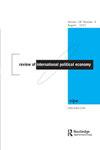Governing cyberspace: policy boundary politics across organizations
IF 3.7
1区 经济学
Q1 ECONOMICS
引用次数: 1
Abstract
Policy boundaries and issue interdependence are not a given. the stakes they imply— who governs, how, and where a policy domain is—become institutionalized over time, often first by the Global North. We know little about how these stakes are presented and institutionalized within and across organizations. We tackle this lacuna by asking how, and to what effect, an emerging policy domain is situated in a densely institutionalized environment. We argue that new policy domains such as cyberspace or artificial intelligence prompt resourceful governments to forum-shop policy frames by clustering promising issues in new and existing organizations in pursuit of coalition-building. initially, resonance is more likely to be established in organizations with like-minded countries, leading to partially differentiated non-hierarchical regime complexes. in the long-term, competing adjustment pressures, particularly felt in the Global south, help trigger a regime-shift to an orchestrating general-purpose organization. Key actors must reconfigure their frames thereby reducing differentiation. in today’s geopolitical world, this hardens intra-organizational political differences. We examine three propositions in the case of cyberspace and show how the proliferation of competing frames across organizations led to shifting the policy debate to the UN, where only piecemeal policy adjustments are possible. Our analysis is based on primary sources and immersion strategies.治理网络空间:跨组织的政策边界政治
政策边界和问题相互依赖不是给定的。它们所隐含的利害关系——谁来治理、如何治理以及政策领域在哪里——随着时间的推移而制度化,通常首先由全球北方国家实现。我们对这些利害关系如何在组织内部和跨组织中呈现和制度化知之甚少。我们通过询问新兴政策领域如何以及以何种效果位于密集制度化的环境中来解决这一空白。我们认为,新的政策领域,如网络空间或人工智能,促使资源丰富的政府通过将有希望的问题聚集在新的和现有的组织中,以寻求建立联盟,从而形成论坛-商店政策框架。最初,在志同道合的国家的组织中更容易建立共鸣,从而导致部分分化的非等级制度复合体。从长期来看,相互竞争的调整压力,特别是在全球南方感受到的压力,有助于触发政权向一个协调的通用组织的转变。关键参与者必须重新配置他们的框架,从而减少差异。在当今的地缘政治世界中,这加剧了组织内部的政治分歧。我们研究了网络空间中的三个命题,并展示了跨组织竞争框架的扩散如何导致政策辩论转移到联合国,在那里只能进行零星的政策调整。我们的分析是基于第一手资料和沉浸策略。
本文章由计算机程序翻译,如有差异,请以英文原文为准。
求助全文
约1分钟内获得全文
求助全文
来源期刊
CiteScore
9.20
自引率
9.30%
发文量
47
期刊介绍:
The Review of Political Economy is a peer-reviewed journal welcoming constructive and critical contributions in all areas of political economy, including the Austrian, Behavioral Economics, Feminist Economics, Institutionalist, Marxian, Post Keynesian, and Sraffian traditions. The Review publishes both theoretical and empirical research, and is also open to submissions in methodology, economic history and the history of economic thought that cast light on issues of contemporary relevance in political economy. Comments on articles published in the Review are encouraged.

 求助内容:
求助内容: 应助结果提醒方式:
应助结果提醒方式:


